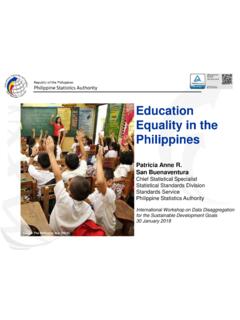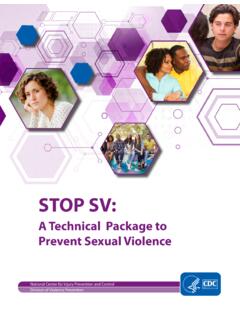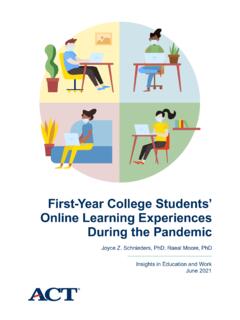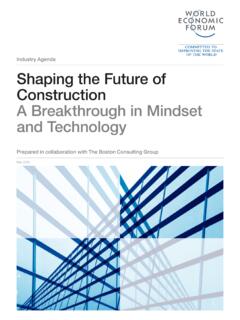Transcription of Influence of Social Media on Psychosocial Behaviour and ...
1 JOURNAL OF EDUCATION & ENTREPRENEURSHIP Formerly Journal of Educational Policy and Entrepreneurial Research ISSN: 2408-770X (Print), ISSN: 2408-6231 (Online) Vol. 5, , 36-46, 2018 Influence of Social Media on Psychosocial Behaviour and Academic Performance of Secondary School Students Talatu Ibrahim Umar and Murja Idris Abstract This study investigated the Influence of Social Media on Psychosocial Behaviour and academic performance of secondary school students. It was conducted in Batagarawa Local Government, Katsina State, Nigeria. Two research hypotheses were formulated for the study, and descriptive survey research design was employed. The target population consists of four secondary schools purposively selected out of the seven public schools and 306 SSII students were randomly selected for the study.
2 Researcher-made validated questionnaire and academic performance test in English Language was used for data collection. Collected data was analyzed using descriptive statistics of mean and standard deviation. Null hypotheses were subjected to t-test of independent samples. The study found among others that, Social Media usage has negative Influence on Psychosocial Behaviour and academic performance. It therefore recommended that parents, teachers, educational psychologists should pay more attention to their student s attitude on these platforms and also educate them on time management as not to waste too much of their time chatting, they should concentrate on their studies.
3 Keywords: Social Media , Psychosocial Behaviour and Academic Performance Manuscript History Received on 08th March, 2018 Accepted on 23th April, 2018 Journal of Education & Entrepreneurship 37 Umar and Idris here has been a growing concern over the past couple of decades regarding Social Media usage among senior secondary school students, and its Influence on their life and education. Today s younger generation is hooked on Social Media , and this digital landscape has put increased pressure on teenagers. Formerly, communicating and free sharing of thoughts between individuals was limited due to distances, but now even with the barriers of nationality or religion, the flow of information and knowledge is still continuing through the new globalization of Social Media .
4 Social Media refers to the means of interaction among individuals young and old where they create, share, exchange, and comment within themselves using different networks at their disposal. Oberiri and Greg (2017) observed that most utilized Social networking site was Facebook hence only very few students use the sites for academic progress or development. While the most encountered problems are receiving unwanted comments, pictures, and videos, however, the idea of Social Media was to keep this global world more connected, but it has done more than that, it has become the fourth meal of the day for the younger generations. In todays society, Social Media has become a part of everyday lives.
5 People access all types of information with ease through the use of mobile phones and computers. Social Media networking sites like What Sapp, Facebook, YouTube are more and commonly in use by students across Nigeria. Asdaque, Khan and Rizvi (2010) carried out a study using one hundred undergraduate students of two federal universities in Pakistan. The study focused on internet usage and its outcomes on academic performance, which revealed a negative relationship between the two, even though the research was conducted within the same environment and setting. The Social Media networking websites been used were not specified nor highlight at what time of the day is it mostly used which resulted in poor performance among college students.
6 A number of researches that investigated the impact of Social Media usage has revealed that it add significant value through the availability of materials online (Aligwe, Ugochukwu & Nwafor, 2017; Apuke, 2016 ; Fasae and Adegbilero-Iwari, 2016 ). Psychosocial Behaviour is seen as the response or reaction of how an individual behaves and develop his/her relationship in the school environment or anywhere the person found him/herself as a result of the use of mobile phones, IPads, tablets, laptops and other internet services. Reasonable attention has been given to the negative side of Social networking sites; such as cyberbullying, parent-child interactions, internet addiction, and the Influence of Social Media use on sleep disturbance and academic performance.
7 Suhail and Bargees (2006) conducted a study on the effect of Social networking in Pakistan using the internet effect scale (IES) to determine the effect of some factors specifically that which includes behavioral issues, educational problems, internet abuse, interpersonal problems, and psychological issues as well as its consequences. The result of the studies showed that Social Media networking has both positive and negative advantages on its users. The connectivism between spare times spent on the internet showed tremendous impact, that the time spent on internet has affected students interpersonal, academic, psychological and physical factors.
8 Also, it recommended that the use of internet may perhaps be used in enhancing academic performance among students. Most adolescents come across different levels of negative experiences through SNSs, the ferocity of online bullying is exacerbated, some adolescents may be more exposed to develop at-risk indicators of internet addiction than others, while some may be experiencing other TJournal of Education & Entrepreneurship 38 Umar and Idris psychological symptoms and syndromes such as depression, ADHD symptoms or aggression (Shapiro & Margolin, 2014).
9 Akhtar (2013) revealed that immoderate usage of internet can result to addiction among students, and it could lead to poor academic attainment. The author opined that net addiction can cause reduction in time spent on studies, fundamental drop in grades, low interest in extracurricular activities and loss of interest in lessons. Furthermore, net addiction amongst adolescents has been related to psychological and intellectual problems which include anxiety, despair and loneliness. Hence, other researches on Social Media networking have depicted a superb academic interplay and have supported net utilization amongst students. However, negative impact of Social Media has outweighed the tremendous aspects.
10 Thus, excessive utilization of Social Media has shown negative effect on student s physical, psychological as well as Family fitness. Furthermore, immoderate utilization has additionally been related to sleep deprivation, insomnia and continual illnesses (O keeffe and Pearson, 2011). Social Media sites offer students new opportunities and challenges for self-expression of individual s worth to the world (their likes & dislikes) and get immediate feedbacks. Most of the students express their views to both the known and unknown recipients. They widely share their views with varying degrees of accuracy, honesty and openness that have been private before now or reserved for selected individuals.















